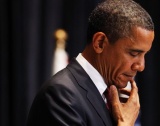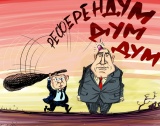АБОНАМЕНТ ЗА НОВИНИ [X]
Обама сам срещу Сирия
 10:16 | 30.08.2013
10:16 | 30.08.2013 843
843  коментари 0
коментари 0
В този момент се провежда извънредно заседание на Съвета по сигурността към Министерския съвет във връзка със ситуацията в Сирия и отражението й върху националната сигурност на България.
Парламентът на Великобритания отхвърли участието на страната във военна операция в Сирия. Правителството поиска от Камарата на представителите пълномощия за военни удари срещу химическия арсенал на президента Башар Асад. Опозиционните лейбъристи обаче блокираха искането с подкрепата на тридесет депутати от Консервативната партия на министър-председателя Дейвид Камерън. Администрацията на американския президент Барак Обама обаче не се е отказала да търси съюзници за удар срещу Сирия, съобщи министърът на отбраната на САЩ Чък Хейгъл. От консултации с конгресмени с Вашингтон стана ясно, че разузнаването все още не разполага със сигурно доказателство, уличаващо режима на Башар Асад в употребата на химическо оръжие срещу своя народ. Според осведомен източник от Брюксел, цитиран от ИТАР-ТАСС, най-малко 12 страни от НАТО вече изключиха възможността да вземат участие във военна операция срещу Сирия, ако тя не е одобрена от Съвета за сигурност. Ето как отразява новината The Washington Post White House: Obama can go it alone on Syria By Karen DeYoungThe administration insisted Thursday that President Obama has both the authority and the determination to make his own decision on a military strike against Syria, even as a growing chorus of lawmakers demanded an opportunity to vote on the issue and Britain, the United States’ closest ally, appeared unlikely to participate.
Britain’s sudden withdrawal came after Prime Minister David Cameron, deserted by rebels in his own Conservative Party, lost a parliamentary vote for provisional authorization for military action in Syria.
Cameron, who had strongly backed Obama’s pledge to ensure that Syria would face “consequences” for its alleged use of chemical weapons, said he would respect Parliament’s will. Many in his government attributed the vote loss to the legacy of British participation in the 2003 U.S. invasion and subsequent occupation of Iraq, based on false claims about weapons of mass destruction.
A statement distributed by the White House said: “The U.S. will continue to consult with the UK government — one of our closest allies and friends. As we’ve said, President Obama’s decision-
making will be guided by what is in the best interests of the United States. He believes that there are core interests at stake for the United States and that countries who violate international norms regarding chemical weapons need to be held accountable.”
Both privately and publicly, administration officials continued to portray Obama as edging closer to a decision to launch a limited cruise-missile strike on Syrian military targets. As a fifth U.S. warship entered the Mediterranean, Obama’s top national security officials briefed congressional leaders on evidence that they say proves that Syrian President Bashar al-Assad’s government killed hundreds of civilians in an Aug. 21 chemical weapons attack outside Damascus.
But as more time has elapsed between the Syrian attack and the much-previewed U.S. retaliation, the window for questions and demands from Congress, international allies and the news media has opened wider.
Nearly 200 House members from both parties have signed letters calling on the president to seek formal congressional approval for military action.
Others agree with Sen. Robert Menendez (D-N.J.), chairman of the Foreign Relations Committee, who said in an interview that the president has “certain powers even under the War Powers Act that he can use [in] the national interest of security, and he can act.”
But while many would support action against the Syri regime, Menendez said, “they want [Obama] to come before them and explain it.”
Sen. Bob Corker (Tenn.), the senior Republican on the Foreign Relations Committee, said after Thursday’s administration briefings that he would “support surgical, proportional military strikes given the strong evidence” of chemical weapons use. But Corker said that “whatever limited action is taken should not further commit the U.S. in Syria beyond the current strategy” of supporting moderate opposition forces fighting Assad’s military. He called for continued consultation and said the administration would be “far better off if they seek authorization based upon our national interests, which would provide the kind of public debate and legitimacy that can only come from Congress.”
In a telephone call Thursday with House Speaker John A. Boehner (R-Ohio), Obama “briefed the speaker on the status of deliberations over Syria,” while Boehner “sought answers to concerns . . . including the legal justification for any strike, the policy and precedent such a response would set, and the objectives and strategy for any potential action,” said Boehner press secretary Brendan Buck.
“Only the president can answer these questions, and it is clear that further dialogue and consultation with Congress, as well as communication with the American public, will be needed,” Buck said.
Senate Majority Leader Harry M. Reid (D-Nev.) has been in regular contact with Obama in recent days, according to Senate aides.
The White House has said that it will provide Congress with an additional classified assessment of Assad’s responsibility for what it has called an “undeniable” chemical attack and will publicly release an unclassified version this week.
But support for a military strike appeared to be quickly waning. Even in France, where President François Hollande just days ago said Syria should be “punished,” officials called for a delay in any action until United Nations weapons inspectors, who are in Syria, complete their investigation. “Before acting, we need proof,” said Najat Vallaud-Belkacem, a minister and government spokeswoman.
U.N. Secretary General Ban Ki-moon told reporters in Vienna that the investigators will continue their on-site work near Damascus on Friday and leave Syria the next day. Ban said he expects an immediate report from the inspectors, but he has made clear that their mission is only to determine whether a chemical attack occurred, not to assign blame.
At the U.N. Security Council, where Russia and China on Wednesday rejected a British-drafted resolution authorizing the use of force against Syria, the five permanent members met again Thursday. But the meeting, called at Russia’s request, lasted less than an hour and didn’t result in any action, according to U.N. officials.
State media reported that two Russian warships were traveling to the eastern Mediterranean. Russia, Assad’s principal foreign backer along with Iran, has a naval base in the Syrian port of Tartus, although many personnel have reportedly been evacuated in recent days.
Iran’s new president, Hassan Rouhani, said his government would cooperate with Russia to prevent a strike against Syria, which he called an “open violation” of international law.
Chinese Foreign Minister Wang Yi called on “all parties to exercise restraint and calm.” Wang said that China opposes the use of chemical weapons but that the United Nations should determine what happened in Syria.
Meanwhile, the overseas edition of China’s People’s Daily, the Communist Party’s main mouthpiece, compared possible intervention in Syria to the “trick” and “excuse” used by the United States to depose Saddam Hussein in Iraq. “Use of force in Syria,” Thursday’s editorial said, “would cause even graver consequences than the war in Iraq.”
Iraq has loomed large in the debate over the wisdom of an attack on Syria and the U.S. right to conduct one.
In a now-infamous presentation to the United Nations in February 2003, then-Secretary of State Colin L. Powell offered audio intercepts, photographs and testimony from anonymous witnesses as proof that Hussein was developing chemical, biological and, perhaps, even nuclear weapons — despite evidence to the contrary offered by U.N. investigators.
One month later, U.S. troops invaded, backed by a multinational force whose leading contributor was Britain. Within a year, evidence of Iraqi weapons of mass destruction had collapsed. Britain’s ongoing support for the operation, with troops who remained until 2009 and the loss of 179 soldiers, was widely opposed and helped lead to the defeat of the Labor Party and Cameron’s ascension to office.
White House and State Department spokesmen Thursday parried repeated questions with assertions that Iraq — Obama opposed the 2003 invasion, calling it a “dumb war” — was different from Syria in every respect.
“As we all know in Iraq, the U.S. was trying to prove the existence of weapons of mass destruction,” State Department spokeswoman Marie Harf said. “In Syria, we know that chemical weapons not only exist but that they were used. . . . That’s undeniable.”
At the same time, Harf said, “we’re not considering analogous responses,” because Obama has repeatedly rejected full-scale U.S. military intervention in Syria.
Anne Gearan and Ed O’Keefe in Washington, Anthony Faiola in London and William Wan in Beijing contributed to this report.
| Tweet |
|













